Power, for All: How It Really Works and Why It's Everyone's Business
By Julie Battilana and Tiziana Casciaro
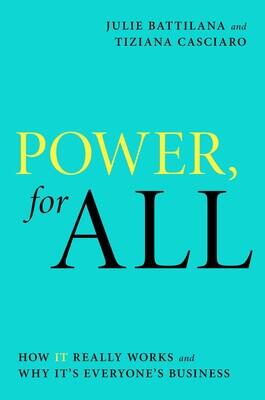 Power is one of the most misunderstood—and therefore vilified—concepts in our society. Many assume power is predetermined by personality or wealth, or that it’s gained by strong-arming others. You might even write it off as “dirty” and want nothing to do with it. But by staying away from power, you give it up to someone else who may not have your best interest in mind. We must understand and use our power to have impact, and pioneering researchers Julie Battilana and Tiziana Casciaro provide the playbook for doing so in Power, for All. (Read more at Simon & Schuster)
Power is one of the most misunderstood—and therefore vilified—concepts in our society. Many assume power is predetermined by personality or wealth, or that it’s gained by strong-arming others. You might even write it off as “dirty” and want nothing to do with it. But by staying away from power, you give it up to someone else who may not have your best interest in mind. We must understand and use our power to have impact, and pioneering researchers Julie Battilana and Tiziana Casciaro provide the playbook for doing so in Power, for All. (Read more at Simon & Schuster)
Faculty Associate Julie Battilana is a professor of business administration at Harvard Business School.
Dignity in the Egyptian Revolution: Protest and Demand during the Arab Uprisings
By Zaynab El Bernoussi, International University of Rabat
 Dignity, or karama in Arabic, is a nebulous concept that challenges us to reflect on issues such as identity, human rights, and faith. During the Arab uprisings of 2010 and 2011, Egyptians that participated in these uprisings frequently used the concept of dignity as a way to underscore their opposition to the Mubarak regime. Protesting against the indignity of the poverty, lack of freedom and social justice, the idea of karama gained salience in Egyptian cinema, popular literature, street art, music, social media and protest banners, slogans and literature. Based on interviews with participants in the 2011 protests and analysis of the art forms that emerged during protests, Zaynab El Bernoussi explores understandings of the concept of dignity, showing how protestors conceived of this concept in their organisation of protest and uprising, and their memories of karama in the aftermath of the protests, revisiting these claims in the years subsequent to the uprising. (Read more at Cambridge University Press)
Dignity, or karama in Arabic, is a nebulous concept that challenges us to reflect on issues such as identity, human rights, and faith. During the Arab uprisings of 2010 and 2011, Egyptians that participated in these uprisings frequently used the concept of dignity as a way to underscore their opposition to the Mubarak regime. Protesting against the indignity of the poverty, lack of freedom and social justice, the idea of karama gained salience in Egyptian cinema, popular literature, street art, music, social media and protest banners, slogans and literature. Based on interviews with participants in the 2011 protests and analysis of the art forms that emerged during protests, Zaynab El Bernoussi explores understandings of the concept of dignity, showing how protestors conceived of this concept in their organisation of protest and uprising, and their memories of karama in the aftermath of the protests, revisiting these claims in the years subsequent to the uprising. (Read more at Cambridge University Press)
Former Visiting Scholar Zaynab El Bernoussi is an assistant professor at Universite Internationale de Rabat.
Oceanic Islam: Muslim Universalism and European Imperialism
Edited by Sugata Bose and Ayesha Jalal
 The Indian Ocean interregional arena is a space of vital economic and strategic importance characterized by specialized flows of capital and labor, skills and services, and ideas and culture. Islam in particular and religiously informed universalism in general once signified cosmopolitanism across this wide realm. This historical reality is at variance with contemporary conceptions of Islam as an illiberal religion that breeds intolerance and terrorism. The future balance of global power will be determined in large measure by policies of key actors in the Indian Ocean and the lands that abut it rather than in the Atlantic or the Pacific. The interplay of multiple and competing universalisms in the Indian Ocean arena is in urgent need of better understanding. (Read more at Bloomsbury Publishing)
The Indian Ocean interregional arena is a space of vital economic and strategic importance characterized by specialized flows of capital and labor, skills and services, and ideas and culture. Islam in particular and religiously informed universalism in general once signified cosmopolitanism across this wide realm. This historical reality is at variance with contemporary conceptions of Islam as an illiberal religion that breeds intolerance and terrorism. The future balance of global power will be determined in large measure by policies of key actors in the Indian Ocean and the lands that abut it rather than in the Atlantic or the Pacific. The interplay of multiple and competing universalisms in the Indian Ocean arena is in urgent need of better understanding. (Read more at Bloomsbury Publishing)
Faculty Associate Sugata Bose is Gardiner Professor of Oceanic History and Affairs at Harvard University.
Kashmir and the Future of South Asia
Edited By Sugata Bose and Ayesha Jalal
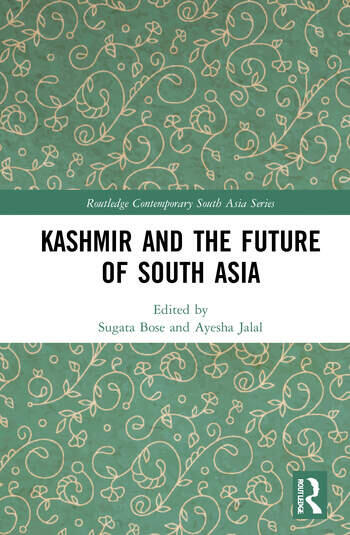 This book uses an innovative people-centered approach to the Kashmir problem to shed new light on why postcolonial partitions remain unfinished and why the wounds of postcolonial nation-state formation in South Asia continue to fester.
This book uses an innovative people-centered approach to the Kashmir problem to shed new light on why postcolonial partitions remain unfinished and why the wounds of postcolonial nation-state formation in South Asia continue to fester.
"Kashmir" is viewed as a metaphor for the permanent internal wars of partition that mark the South Asian experience. Chapters sensitively bring Kashmiri voices to the fore to examine Kashmir in the national discourses of India and Pakistan, resistance in the Kashmiri imagination and the Kashmir conflict in a global context. The book foregrounds how the space of Kashmir as a cultural, historical and political sphere persists and continues to haunt the postcolonial national present as the people of Kashmir and their cultural, literary and artistic productions cannot be contained within the regnant paradigms of the nations across which the region is partitioned. Additionally, the book explores how long-term resolution would demand engagement with historical forces, political actors and social formations that exceed the nation-state. (Read more at Routledge)
Faculty Associate Sugata Bose is Gardiner Professor of Oceanic History and Affairs at Harvard University.
Infrastructure Economics and Policy: International Perspectives
Edited by José A. Gómez-Ibáñez and Zhi Liu
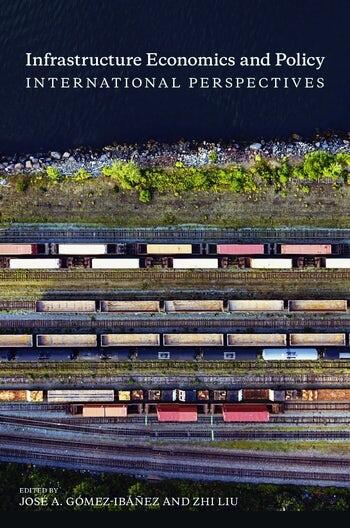 Sustainably built and funded infrastructure is indispensable to resilient, equitable, and livable communities and regions worldwide. In this rare comparison of infrastructure across countries and sectors, leading international academics and practitioners consider the latest approaches to infrastructure policy, implementation, and finance. Chapters cover land value capture and other funding mechanisms; the role of infrastructure in urban form, economic performance, and quality of life, especially for disinvested communities; and other essential concepts, economic theories, and policy considerations. (Read more at Columbia University Press)
Sustainably built and funded infrastructure is indispensable to resilient, equitable, and livable communities and regions worldwide. In this rare comparison of infrastructure across countries and sectors, leading international academics and practitioners consider the latest approaches to infrastructure policy, implementation, and finance. Chapters cover land value capture and other funding mechanisms; the role of infrastructure in urban form, economic performance, and quality of life, especially for disinvested communities; and other essential concepts, economic theories, and policy considerations. (Read more at Columbia University Press)
Faculty Associate (emeritus) José Antonio Gómez-Ibáñez is Derek C. Bok Research Professor of Urban Planning and Public Policy at Harvard Kennedy School and Harvard Graduate School of Design.
Islamic Scholarship in Africa: New Directions and Global Contexts
Edited by Ousmane Oumar Kane
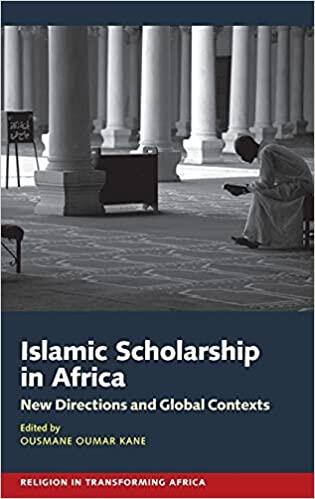 The study of Islamic erudition in Africa is growing rapidly, transforming not just Islamic studies, but also African Studies. This interdisciplinary volume from leading international scholars fills a lacuna in presenting not only the history and spread of Islamic scholarship in Africa, but its current state and future concerns. Challenging the notion that Muslim societies in black Africa were essentially oral prior to the European colonial conquest at the turn of the 20th century, and countering the largely Western division of sub-Saharan Africa and North Africa, the authors take an inclusive approach to advance our knowledge of the contribution of people of African descent to the life of Mecca. (Read more at Boydell & Brewer)
The study of Islamic erudition in Africa is growing rapidly, transforming not just Islamic studies, but also African Studies. This interdisciplinary volume from leading international scholars fills a lacuna in presenting not only the history and spread of Islamic scholarship in Africa, but its current state and future concerns. Challenging the notion that Muslim societies in black Africa were essentially oral prior to the European colonial conquest at the turn of the 20th century, and countering the largely Western division of sub-Saharan Africa and North Africa, the authors take an inclusive approach to advance our knowledge of the contribution of people of African descent to the life of Mecca. (Read more at Boydell & Brewer)
Faculty Associate Ousmane Oumar Kane is Prince Alwaleed Bin Talal Professor of Contemporary Islamic Religion and Society at Harvard Divinity School, and professor of African and African American studies at Harvard University.
Designing Social Inquiry: Scientific Inference in Qualitative Research, New Edition
By Gary King, Robert O. Keohane, and Sidney Verba
 Designing Social Inquiry presents a unified approach to qualitative and quantitative research in political science, showing how the same logic of inference underlies both. This stimulating book discusses issues related to framing research questions, measuring the accuracy of data and the uncertainty of empirical inferences, discovering causal effects, and getting the most out of qualitative research. It addresses topics such as interpretation and inference, comparative case studies, constructing causal theories, dependent and explanatory variables, the limits of random selection, selection bias, and errors in measurement. The book only uses mathematical notation to clarify concepts, and assumes no prior knowledge of mathematics or statistics. (Read more at Princeton University Press)
Designing Social Inquiry presents a unified approach to qualitative and quantitative research in political science, showing how the same logic of inference underlies both. This stimulating book discusses issues related to framing research questions, measuring the accuracy of data and the uncertainty of empirical inferences, discovering causal effects, and getting the most out of qualitative research. It addresses topics such as interpretation and inference, comparative case studies, constructing causal theories, dependent and explanatory variables, the limits of random selection, selection bias, and errors in measurement. The book only uses mathematical notation to clarify concepts, and assumes no prior knowledge of mathematics or statistics. (Read more at Princeton University Press)
Faculty Associate Gary King is Albert J. Weatherhead III University Professor and director of the Institute for Quantitative Social Science at Harvard University.
Humane: How the United States Abandoned Peace and Reinvented War
By Samuel Moyn
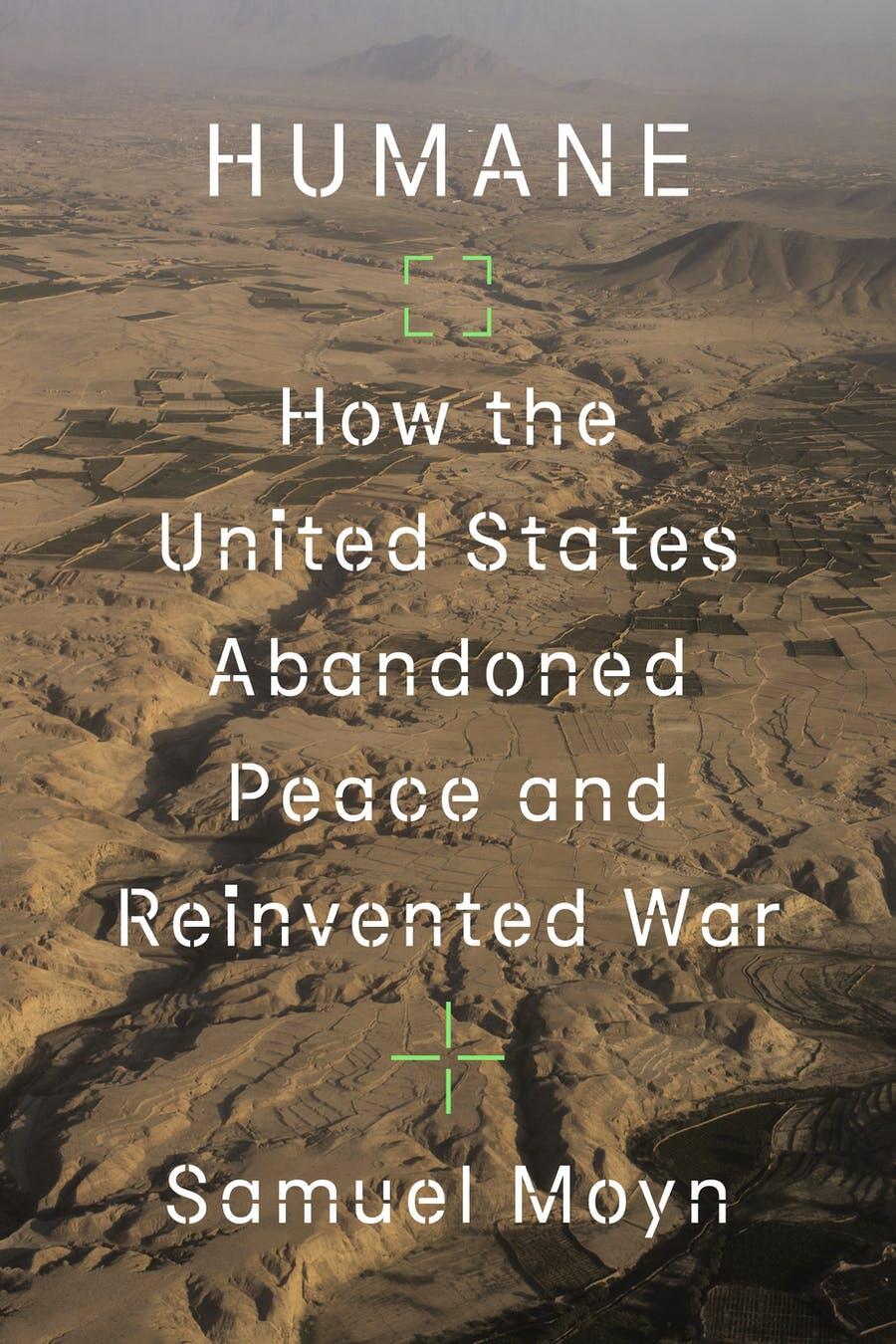 In the years since 9/11, we have entered an age of endless war. With little debate or discussion, the United States carries out military operations around the globe. It hardly matters who’s president or whether liberals or conservatives operate the levers of power. The United States exercises dominion everywhere.
In the years since 9/11, we have entered an age of endless war. With little debate or discussion, the United States carries out military operations around the globe. It hardly matters who’s president or whether liberals or conservatives operate the levers of power. The United States exercises dominion everywhere.
In Humane: How the United States Abandoned Peace and Reinvented War, Samuel Moyn asks a troubling but urgent question: What if efforts to make war more ethical—to ban torture and limit civilian casualties—have only shored up the military enterprise and made it sturdier? To advance this case, Moyn looks back at a century and a half of passionate arguments about the ethics of using force. In the nineteenth century, the founders of the Red Cross struggled mightily to make war less lethal even as they acknowledged its inevitability. Leo Tolstoy prominently opposed their efforts, reasoning that war needed to be abolished, not reformed—and over the subsequent century, a popular movement to abolish war flourished on both sides of the Atlantic. Eventually, however, reformers shifted their attention from opposing the crime of war to opposing war crimes, with fateful consequences. (Read more at Macmillan)
Former Faculty Associate Samuel Moyn is Henry R. Luce Professor of Jurisprudence at Yale University.
Blood and Diamonds: Germany’s Imperial Ambitions in Africa
By Steven Press
 Since the late 1990s, activists have campaigned to remove “conflict diamonds” from jewelry shops and department stores. But if the problem of conflict diamonds—gems extracted from war zones—has only recently generated attention, it is not a new one. Nor are conflict diamonds an exception in an otherwise honest industry. The modern diamond business, Steven Press shows, owes its origins to imperial wars and has never escaped its legacy of exploitation.
Since the late 1990s, activists have campaigned to remove “conflict diamonds” from jewelry shops and department stores. But if the problem of conflict diamonds—gems extracted from war zones—has only recently generated attention, it is not a new one. Nor are conflict diamonds an exception in an otherwise honest industry. The modern diamond business, Steven Press shows, owes its origins to imperial wars and has never escaped its legacy of exploitation.
In Blood and Diamonds, Press traces the interaction of the mass-market diamond and German colonial domination in Africa. Starting in the 1880s, Germans hunted for diamonds in Southwest Africa. In the decades that followed, Germans waged brutal wars to control the territory, culminating in the genocide of the Herero and Nama peoples and the unearthing of vast mineral riches. Press follows the trail of the diamonds from the sands of the Namib Desert to government ministries and corporate boardrooms in Berlin and London and on to the retail counters of New York and Chicago. As Africans working in terrifying conditions extracted unprecedented supplies of diamonds, European cartels maintained the illusion that the stones were scarce, propelling the nascent U.S. market for diamond engagement rings. Convinced by advertisers that diamonds were both valuable and romantically significant, American purchasers unwittingly funded German imperial ambitions into the era of the World Wars. (Read more at Harvard University Press)
Former Graduate Student Associate Steven Press is an assistant professor of history at Stanford University.
The Fractured Himalaya: India China Tibet 1949–1962
By Nirupama Rao
 In the India-China relationship, the past shadows the present. It shapes current policy options and approaches, and strongly influences public debate in India to this day. While the period from 1949 to 1962 is crucial as Jawaharlal Nehru sought—unsuccessfully—to establish a workable relationship with the Chinese, the pre-independence history of the British colonial government’s relations with Tibet, the genesis of the McMahon Line, Communist China’s military take-over and domination of Tibet, together with the unshakeable foundational belief amongst Indians that the Himalayas form the country’s sacred boundary, combined to powerfully impact India’s relations with China. (Read more at Amazon)
In the India-China relationship, the past shadows the present. It shapes current policy options and approaches, and strongly influences public debate in India to this day. While the period from 1949 to 1962 is crucial as Jawaharlal Nehru sought—unsuccessfully—to establish a workable relationship with the Chinese, the pre-independence history of the British colonial government’s relations with Tibet, the genesis of the McMahon Line, Communist China’s military take-over and domination of Tibet, together with the unshakeable foundational belief amongst Indians that the Himalayas form the country’s sacred boundary, combined to powerfully impact India’s relations with China. (Read more at Amazon)
Former Fellow Nirupama Rao is a retired Indian diplomat, foreign secretary, and ambassador.
An Infinite History: The Story of a Family in France over Three Centuries
By Emma Rothschild
 Marie Aymard was an illiterate widow who lived in the provincial town of Angoulême in southwestern France, a place where seemingly nothing ever happened. Yet, in 1764, she made her fleeting mark on the historical record through two documents: a power of attorney in connection with the property of her late husband, a carpenter on the island of Grenada, and a prenuptial contract for her daughter, signed by eighty-three people in Angoulême. Who was Marie Aymard? Who were all these people? And why were they together on a dark afternoon in December 1764? Beginning with these questions, An Infinite History offers a panoramic look at an extended family over five generations. Through ninety-eight connected stories about inquisitive, sociable individuals, ending with Marie Aymard’s great-great granddaughter in 1906, Emma Rothschild unfurls an innovative modern history of social and family networks, emigration, immobility, the French Revolution, and the transformation of nineteenth-century economic life. (Read more at Princeton University Press)
Marie Aymard was an illiterate widow who lived in the provincial town of Angoulême in southwestern France, a place where seemingly nothing ever happened. Yet, in 1764, she made her fleeting mark on the historical record through two documents: a power of attorney in connection with the property of her late husband, a carpenter on the island of Grenada, and a prenuptial contract for her daughter, signed by eighty-three people in Angoulême. Who was Marie Aymard? Who were all these people? And why were they together on a dark afternoon in December 1764? Beginning with these questions, An Infinite History offers a panoramic look at an extended family over five generations. Through ninety-eight connected stories about inquisitive, sociable individuals, ending with Marie Aymard’s great-great granddaughter in 1906, Emma Rothschild unfurls an innovative modern history of social and family networks, emigration, immobility, the French Revolution, and the transformation of nineteenth-century economic life. (Read more at Princeton University Press)
Faculty Associate Emma Rothschild is Jeremy and Jane Knowles Professor of History and director of the Center for History and Economics at Harvard University.
Home in the World: A Memoir
By Amartya Sen
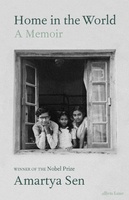 Where is 'home'? For Amartya Sen home has been many places—Dhaka in modern Bangladesh where he grew up, the village of Santiniketan where he was raised by his grandparents as much as by his parents, Calcutta where he first studied economics and was active in student movements, and Trinity College, Cambridge, to which he came aged nineteen.
Where is 'home'? For Amartya Sen home has been many places—Dhaka in modern Bangladesh where he grew up, the village of Santiniketan where he was raised by his grandparents as much as by his parents, Calcutta where he first studied economics and was active in student movements, and Trinity College, Cambridge, to which he came aged nineteen.
Sen brilliantly recreates the atmosphere in each of these. Central to his formation was the intellectually liberating school in Santiniketan founded by Rabindranath Tagore (who gave him his name Amartya) and enticing conversations in the famous Coffee House on College Street in Calcutta. As an undergraduate at Cambridge, he engaged with many of the leading figures of the day. This is a book of ideas—especially Marx, Keynes and Arrow—as much as of people and places. (Read more at Penguin Random House)
Faculty Associate Amartya Sen is Thomas W. Lamont University Professor at Harvard University.
International Norms, Moral Psychology, and Neuroscience
By Richard Price and Kathryn Sikkink
 Research on international norms has yet to answer satisfactorily some of our own most important questions about the origins of norms and the conditions under which some norms win out over others. The authors argue that international relations (IR) theorists should engage more with research in moral psychology and neuroscience to advance theories of norm emergence and resonance. This Element first provides an overview of six areas of research in neuroscience and moral psychology that hold particular promise for norms theorists and international relations theory more generally. It next surveys existing literature in IR to see how literature from moral psychology is already being put to use, and then recommends a research agenda for norms researchers engaging with this literature. The authors do not believe that this exchange should be a one-way street, however, and they discuss various ways in which the IR literature on norms may be of interest and of use to moral psychologists, and of use to advocacy communities. (Read more at Cambridge University Press)
Research on international norms has yet to answer satisfactorily some of our own most important questions about the origins of norms and the conditions under which some norms win out over others. The authors argue that international relations (IR) theorists should engage more with research in moral psychology and neuroscience to advance theories of norm emergence and resonance. This Element first provides an overview of six areas of research in neuroscience and moral psychology that hold particular promise for norms theorists and international relations theory more generally. It next surveys existing literature in IR to see how literature from moral psychology is already being put to use, and then recommends a research agenda for norms researchers engaging with this literature. The authors do not believe that this exchange should be a one-way street, however, and they discuss various ways in which the IR literature on norms may be of interest and of use to moral psychologists, and of use to advocacy communities. (Read more at Cambridge University Press)
Faculty Associate Kathryn Sikkink is Ryan Family Professor of Human Rights Policy at Harvard Kennedy School and Carol K. Pforzheimer Professor at Radcliffe Institute for Advanced Study, Harvard University.
Mental Health, Legal Capacity, and Human Rights
Edited by Michael Ashley Stein, Faraaz Mahomed, Vikram Patel, and Charlene Sunkel
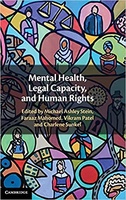 Since adoption of the Convention on the Rights of Persons with Disabilities and the interpretive General Comment 1, the topic of legal capacity in mental health settings has generated considerable debate in disciplines ranging from law and psychiatry to public health and public policy. With over 180 countries having ratified the Convention, the shifts required in law and clinical practice need to be informed by interdisciplinary and contextually relevant research as well as the views of stakeholders. With an equal emphasis on the Global North and Global South, this volume offers a comprehensive, interdisciplinary analysis of legal capacity in the realm of mental health. Integrating rigorous academic research with perspectives from people with psychosocial disabilities and their caregivers, the authors provide a holistic overview of pertinent issues and suggest avenues for reform. (Read more at Cambridge University Press)
Since adoption of the Convention on the Rights of Persons with Disabilities and the interpretive General Comment 1, the topic of legal capacity in mental health settings has generated considerable debate in disciplines ranging from law and psychiatry to public health and public policy. With over 180 countries having ratified the Convention, the shifts required in law and clinical practice need to be informed by interdisciplinary and contextually relevant research as well as the views of stakeholders. With an equal emphasis on the Global North and Global South, this volume offers a comprehensive, interdisciplinary analysis of legal capacity in the realm of mental health. Integrating rigorous academic research with perspectives from people with psychosocial disabilities and their caregivers, the authors provide a holistic overview of pertinent issues and suggest avenues for reform. (Read more at Cambridge University Press)
Faculty Associate Michael Ashley Stein is a visiting professor at Harvard Law School.
Faculty Associate Vikram Patel is The Pershing Square Professor of Global Health and Wellcome Trust Principal Research Fellow at Harvard Medical School and a professor of global health and population at Harvard T.H. Chan School of Public Health.
The Cambridge Companion to Business and Human Rights Law
Edited by Ilias Bantekas and Michael Ashley Stein
 How can businesses operate profitably and sustainably while ensuring that they are applying human rights? It is possible to apply human rights while at the same time decreasing cost and making human rights contribute to profits. Yet business efforts alone are insufficient, and states must possess sufficient regulatory power to work together with businesses and investors—not only to improve human rights but also to foster development more broadly. This textbook, the first of its kind, explores all aspects of the links between business operations and human rights. Its twenty-five chapters guide readers systematically through all the particular features of this intersection, integrating legal and business approaches. Thematic sections cover conceptual and regulatory frameworks, remedies and dispute resolution, and practical enforcement tools. Ideal for courses in business, law, policy and international development, the book is also essential reading for managers in large corporations. (Read more at Cambridge University Press)
How can businesses operate profitably and sustainably while ensuring that they are applying human rights? It is possible to apply human rights while at the same time decreasing cost and making human rights contribute to profits. Yet business efforts alone are insufficient, and states must possess sufficient regulatory power to work together with businesses and investors—not only to improve human rights but also to foster development more broadly. This textbook, the first of its kind, explores all aspects of the links between business operations and human rights. Its twenty-five chapters guide readers systematically through all the particular features of this intersection, integrating legal and business approaches. Thematic sections cover conceptual and regulatory frameworks, remedies and dispute resolution, and practical enforcement tools. Ideal for courses in business, law, policy and international development, the book is also essential reading for managers in large corporations. (Read more at Cambridge University Press)
Faculty Associate Michael Ashley Stein is a visiting professor at Harvard Law School.
Accessible Technology and the Developing World
Edited by Michael Ashley Stein and Jonathan Lazar
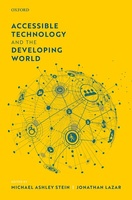 When digital content and technologies are designed in a way that is inaccessible for persons with disabilities, they are locked out of commerce, education, employment, and access to government information. In developing areas of the world, as new technical infrastructures are being built, it is especially important to ensure that accessibility is a key design goal. Unfortunately, nearly all research on Information and Communication Technology (ICT) accessibility and innovation for persons with disabilities-whether from the legal, technical, or development fields-has focused on developed countries, with very little being written about developing world initiatives. Accessible Technology and the Developing World aims to change this, by bringing increased attention to ICT accessibility in developing areas. (Read more at Oxford University Press)
When digital content and technologies are designed in a way that is inaccessible for persons with disabilities, they are locked out of commerce, education, employment, and access to government information. In developing areas of the world, as new technical infrastructures are being built, it is especially important to ensure that accessibility is a key design goal. Unfortunately, nearly all research on Information and Communication Technology (ICT) accessibility and innovation for persons with disabilities-whether from the legal, technical, or development fields-has focused on developed countries, with very little being written about developing world initiatives. Accessible Technology and the Developing World aims to change this, by bringing increased attention to ICT accessibility in developing areas. (Read more at Oxford University Press)
Faculty Associate Michael Ashley Stein is a visiting professor at Harvard Law School.
The Politics of Surviving: How Women Navigate Domestic Violence and Its Aftermath
By Paige Sweet
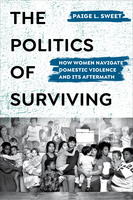 For women who have experienced domestic violence, proving that you are a “good victim” is no longer enough. Victims must also show that they are recovering, as if domestic violence were a disease: they must transform from “victims” into “survivors.” Women’s access to life-saving resources may even hinge on “good” performances of survivorhood. Through archival and ethnographic research, Paige L. Sweet reveals how trauma discourses and coerced therapy play central roles in women’s lives as they navigate state programs for assistance. Sweet uses an intersectional lens to uncover how “resilience” and “survivorhood” can become coercive and exclusionary forces in women’s lives. With nuance and compassion, The Politics of Surviving wrestles with questions about the gendered nature of the welfare state, the unintended consequences of feminist mobilizations for anti-violence programs, and the women who are left behind by the limited forms of citizenship we offer them. (Read more at University of California Press)
For women who have experienced domestic violence, proving that you are a “good victim” is no longer enough. Victims must also show that they are recovering, as if domestic violence were a disease: they must transform from “victims” into “survivors.” Women’s access to life-saving resources may even hinge on “good” performances of survivorhood. Through archival and ethnographic research, Paige L. Sweet reveals how trauma discourses and coerced therapy play central roles in women’s lives as they navigate state programs for assistance. Sweet uses an intersectional lens to uncover how “resilience” and “survivorhood” can become coercive and exclusionary forces in women’s lives. With nuance and compassion, The Politics of Surviving wrestles with questions about the gendered nature of the welfare state, the unintended consequences of feminist mobilizations for anti-violence programs, and the women who are left behind by the limited forms of citizenship we offer them. (Read more at University of California Press)
Former Weatherhead Research Cluster Affiliate Paige Sweet is an assistant professor of sociology at the University of Michigan.
